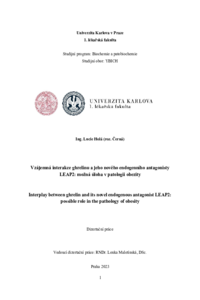Interplay between ghrelin and its novel endogenous antagonist LEAP2: possible role in the pathology of obesity
Vzájemná interakce ghrelinu a jeho nového endogenního antagonisty LEAP2: možná úloha v patologii obezity
dizertační práce (OBHÁJENO)

Zobrazit/
Trvalý odkaz
http://hdl.handle.net/20.500.11956/187013Identifikátory
SIS: 246442
Kolekce
- Kvalifikační práce [4894]
Autor
Vedoucí práce
Oponent práce
Jurčovičová, Jana
Malínská, Hana
Fakulta / součást
1. lékařská fakulta
Obor
Biochemie a patobiochemie
Katedra / ústav / klinika (externí)
Informace není k dispozici
Datum obhajoby
5. 10. 2023
Nakladatel
Univerzita Karlova, 1. lékařská fakultaJazyk
Angličtina
Známka
Prospěl/a
Klíčová slova (česky)
ghrelin, LEAP2, palm-LEAP2(1-14), obezita, ghrelinová rezistence, inverzní agonismusKlíčová slova (anglicky)
LEAP2, ghrelin, palm-LEAP2, obesity, ghrelin resistance, inverse agonistZvyšující se počet osob s nadváhou a obezitou se v naší společnosti stal závažným zdravotním problémem. Obezita je často způsobena nadměrnou hyperfagií, a proto je důležité komplexně rozumět regulaci příjmu potravy, abychom mohli toto chronické onemocnění úspěšně léčit. Ghrelin, periferní peptidový hormon zodpovědný za zvýšení příjmu potravy, přímo ovlivňuje hypotalamus prostřednictvím GHSR (zkratka anglického názvu growth hormone secretagogue receptor). Nedávno bylo zjištěno, že LEAP2 (zkratka anglického názvu liver expressed antimicrobial peptide 2) přirozeně inhibuje konstitutivní aktivitu GHSR jako inverzní agonista. Proto je LEAP2 potenciálně využitelný kandidát pro vývoj antiobezitního léčiva. Tato disertační práce zkoumá interakci mezi ghrelinem a LEAP2 v kontextu regulace příjmu potravy a obezity. Nejprve se zaměřuje na modifikovaný zkrácený N-terminální peptid LEAP2(1-14) a jeho lipidizované analogy a zkoumá jejich afinitu ke GHSR a jeho aktivaci in vitro a in vivo. Výsledky ukazují, že palmitovaný LEAP2(1-14) (palm-LEAP2(1-14)) v porovnání s ostatními analogy vykazuje nejvýraznější afinitu ke GHSR, působí jako inverzní agonista GHSR, snižuje příjem potravy, inhibuje uvolňování růstového hormonu navozeného ghrelinem a vykazuje zvýšenou stabilitu v potkaní plasmě. Tato zjištění naznačují,...
The increasing number of overweight and obese individuals has become a major health issue in our society. The etiology of obesity often involves excessive hyperphagia, highlighting the importance of comprehensive understanding the regulation of food intake regulation in order to effectively treat this chronic condition. Ghrelin, a peripheral peptide hormone responsible for increasing food intake, directly affects the hypothalamus through the growth hormone secretagogue receptor (GHSR). Recently, it was found that liver expressed antimicrobial peptide 2 (LEAP2) naturally counteracts the effects of the GHSR as an inverse agonist. This makes LEAP2 a potential candidate for the development of anti-obesity treatment. This thesis explores the interaction between ghrelin and LEAP2 in the context of food intake regulation and obesity. Firstly, it focuses on modified N-terminal peptide LEAP2(1-14) and its lipidized analogs, examining their affinity to and activation of GHSR in vitro and in vivo. The results demonstrate that palmitoylated LEAP2(1-14) (palm-LEAP2(1-14)) exhibits the most pronounced affinity for GHSR, acts as GHSR inverse agonist, reduces food intake, inhibits growth hormone release, and shows increased stability in rat plasma. These findings suggest that palm-LEAP2(1-14) holds promise as an...
